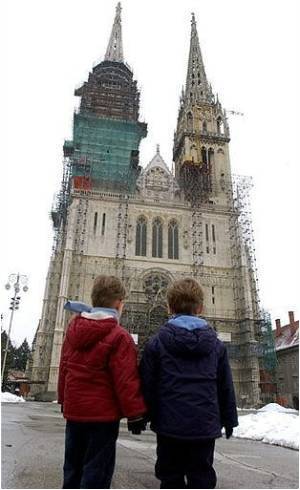The sacking of a rebel priest who criticized the church’s censure against controversial topics has deepened the rift in Catholic Poland as tensions run high in its changing church.

Henryk Hoser, archbishop of Warsaw-Praga, faulted Lemanski for "a lack of respect and disobedience" and said his outburst "caused great damage to and confusion in the heart of the Church community."
An influential figure in the Polish church, Hoser is a physician and president of the episcopate's committee on bioethics, which looks at controversial advances in medicine and biology.
"This is a new stage in the confrontation between an open church and a closed one," said Stanislaw Obirek, a Warsaw-based Catholic theologian and former Jesuit.
After his dismissal, Lemanski initially stood his ground before deciding Monday to leave the parish. He apologised to parishioners -- who had thrown their full support behind him -- and asked them to obey the church hierarchy.
But rather than capitulate, Lemanski went higher and asked the Vatican to rule on his dismissal in the hope that Pope Francis himself would review his case.
Advertisement
He said Lemanski was symbolic of the Church under the new pope: one more attentive to the everyday concerns of its flock and less of a hierarchical, authoritarian institution with little or no tolerance for dissent.
Advertisement
Adam Szostkiewicz, a commentator on Church affairs at the left-wing Polityka weekly, stressed that "Father Lemanski is not calling into question Church doctrine itself."
"He's not a revolutionary. He just spoke according to his conscience, against statements that stigmatise people and whose dignity has been violated."
Lemanski recently defended 26-year-old Agnieszka Ziolkowska, Poland's first test-tube baby, who decided to leave the Catholic Church.
Ziolkowska said that by opposing in-vitro fertilisation (IVF), the church was stigmatising children born via the method.
Debate over IVF returned to the fore in Poland this month after the centre-right government of Prime Minister Donald Tusk introduced a national programme to finance the method -- despite strong church opposition.
Lemanski's calling into question of church doctrine was not the only factor in the row.
"Father Lemanski also exposed himself to criticism from his superiors by actively taking part in Jewish-Catholic dialogue," Szostkiewicz told AFP.
Lemanski alleged that Hoser, 70, had asked him in a private meeting whether he was a Jew and circumcised. The archbishop flatly denied making the comments deemed anti-Semitic by observers in the Polish media.
In a statement Monday, the Polish Council of Christians and Jews -- of which Lemanski is a member -- defended the priest.
It called him "a man of exceptional achievements in honouring the memory of the former Jewish presence and of the tragic wartime Holocaust."
Poland was once Europe's Jewish heartland, before Nazi Germany's genocide wiped out 90 percent of the country's 3.3 million Jews.
Poland was left overwhelmingly Catholic and even saw compatriot Karol Wojtyla become Pope John Paul II.
Since his death in 2005, the Church "has had a problem with democracy, and the conflict around Father Lemanski is clear proof," Szostkiewicz said.
While over 90 percent of Poles identify themselves as Roman Catholic, ever fewer are heading for the pews on Sunday.
"Despite a drop in attendance -- 40 percent of people attend mass against 50-60 percent only a couple years ago -- the Church still feels very strong. It remains deaf to rational argument," Szostkiewicz said.
"What is happening around Father Lemanski would not be possible in the west, where this absence of dialogue, this coercion against a priest would be unthinkable."
"But the faithful will not put up with it. The seeds have been sown. Lemanski's parishioners will not forget him."
Source-AFP









